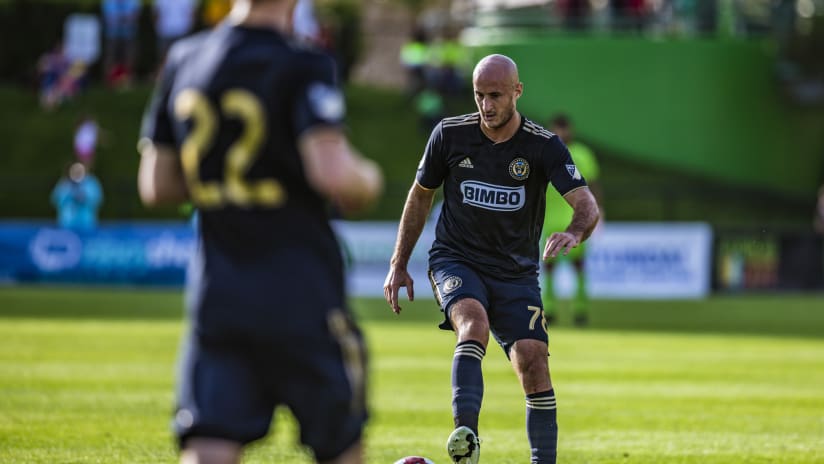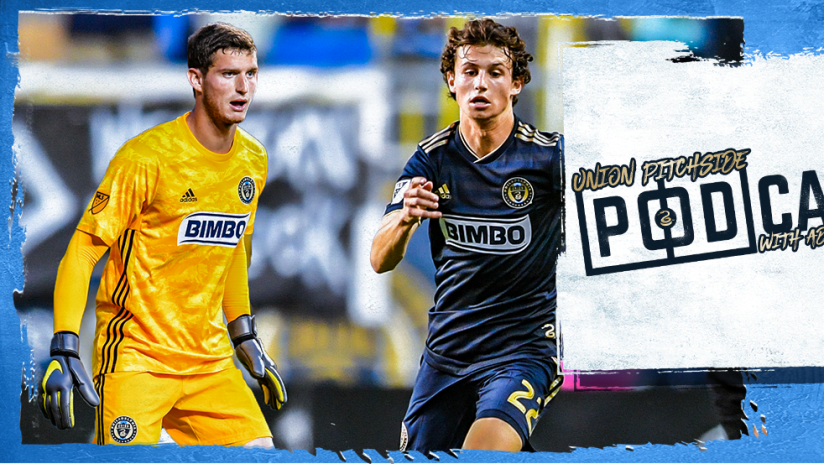In the past month, Philadelphia Union have faced New York Red Bulls twice. If you took the Red Bulls’ soccer philosophy and flipped it upside down in every way, you might get the Vancouver Whitecaps. Carl Robinson runs a team that, if they ever found themselves high pressing, it would be immediately followed by a record scratch and a narrator saying, “You’re probably wondering how I got here.”
Who are the Vancouver Whitecaps
If Red Bulls are about efficiency, the Whitecaps are about pragmatism. They play a system that is simple to organize and execute defensively, and they are determined to punish on the break. Two banks of four players sit just outside the Vancouver box, sliding with dull regularity across the field to keep the ball and opponent in front of them. Robinson’s men will let you shoot from outside the box, but they won’t give you a clean look. They want you to get frustrated and force the ball into the center, and when you do…
The front four
The wings of Vancouver’s four-man midfield include a miniature Uruguayan and a massive Canadian. Though only one of them has size, both have exceptional speed, and when isolated they can be nearly unstoppable. Defensively, the wings tuck into the center, forcing play wide so teams need to settle for crosses or aim passes into tight spaces. Once they turn an opponent over, Techera, diminutive and darting on the right, and Alphonso Davies, lanky and fearsome on the left, are fired out of cannons and seek out spaces behind the fullbacks. The ‘Caps deep shape means they often seduce wide defenders forward and exploit the gaps they leave behind.
You could send centerbacks wide to protect those gaps, but they you leave Kei Kamara and Yordy Reyna with room to operate through the center. Kamara, one of the league’s great aerial artists, is the bigger body and name, but Reyna is the secret sauce for the ‘Caps. Playing as a striker, Reyna essentially provides Vancouver with a third winger running through the center. The Peruvian can distribute and score, creating a broad range of combinations Vancouver can create as they advance -- always at top speed -- on the counter.
Early in the season, when Robinson was experimenting with Anthony Blondell up top and the ‘Caps form was decidedly inconsistent, the Canadian club had a distinct tendency to attack up the right, pouring balls into the box for Brek Shea, Blondell, and Kamara. In more recent weeks, however, Davies has begun to come into his own, culminating in a devastating one-man show against Orlando City SC in which his dribbling led to cards for nearly every player in purple and walking papers for Jason Kreis.
The big threat from Vancouver is not the intricacy of their attack, but the varied, unpredictable ways it can develop. They can play through Kamara if you set up to block lanes to the wingers, and they can go longer and run onto the ball if you get too tight defensively. And if your transition spacing is off? Let’s ask Will Johnson what happens.
How do you stop them?
Over their current six match unbeaten streak, the ‘Caps are averaging 2.66 goals per match. So… can you stop them?
Of course -- but it takes awareness and discipline.
First, the Union must execute a high intensity counterpress after turnovers. The initial feeling after losing a ball is to take a mental moment to release frustration, but to contain the ‘Caps, Philly must overcome that urge and immediately close down outlets, specifically cutting off any service to Felipe. The Brazilian has made a career of being a nuisance, but he’s also the only player in Vancouver’s likely back six that play longer passes with any consistency.
This pressing must be done thoughtfully, especially by Warren Creavalle. The defensive wizard will take Haris Medunjanin’s deep midfield role, which means he will need to make a decision about whether to step forward and close down Felipe following turnovers, or if the smarter play is to drop and provide help on Vancouver’s streaking wingers.
Below, you can see what happens when holding mids get sucked into the center and leave space for Davies in the channel. The ball is going to pop out to the young Canadian, and when he’s at full sprint he’s nearly unplayable.

Another area of concern for the Union will be controlling their box defensively. Kamara is a predator in the area, and he provides a different challenge than Bradley Wright-Phillips or Giovinco. Though BWP is strong in the air, he is a master at finding sneaky pockets of space, whereas Kamara is willing to create contact at ride roughshod over a defender.
Philly’s young central defense may benefit from being able to track the physical striker more easily than Giovinco, but they cannot be caught offguard by Kamara’s late runs; he is nearly impossible to stop once he has a head of steam.
Attacking the white wall
How do you threaten a team that won’t come out of its deep shape? Patience and speed of play.
Patience means a willingness to wait for gaps to develop. Passing the ball outside of eight deep men forces them to slide horizontally. While this may be simple to do once, twice, or three times, eventually a player gets lazy or tired, and then you must recognize and attack. Additionally, skill players must move within Vancouver’s defensive shape. When a player shifts around inside two blocks of four, he creates a new reference point for defenders. Ideally, in many zonal defensive systems, each defender’s main reference points to determine where they should be are their teammates and the ball. But if someone like CJ Sapong, Cory Burke, or Borek Dockal is also moving within the defensive shape, a defender may latch onto that attacker and move independently from the rest of the unit. Once again, a gap is the result.
Regardless of how penetration occurs, it is more likely to come in wide areas. They question, then, is what to do in these areas. One option is to play in crosses, and Vancouver’s large defenders won’t complain if you do. An alternative is to play combinations on the wings and look to make a penetrating run through the channel behind the defense. This can create ideal situations for low cutback crosses or early, hard balls toward the front post. Putting men in the right positions to finish those setup balls is essential for the Union.
Vancouver is hot right now, and if Alphonso Davies is truly beginning to reach full bloom, they become a truly dangerous team in the west. But even with all their recent success, the ‘Caps still only average one expected goal on the road while giving up two per match.
The Union will get chances, and they will likely give up a dangerous break or two. But if the teenaged centerbacks control the box and Philly’s strikers make hard runs in attack, Philly will be over the 20 point mark by Sunday.














